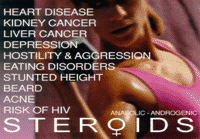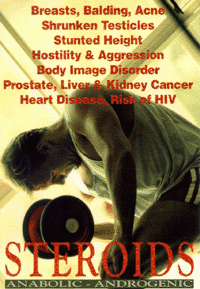
As part of NIDA's anabolic steroids initiative, the Institute has distributed more than 500,000 "art" cards-colorful postcards with messages about the harmful effects of steroid abuse-in gyms, restaurants, bookstores, and clubs. |
To reverse the rising use of anabolic steroids by high school-age children, NIDA and seven national partners have launched an initiative designed to alert the public about the risks associated with anabolic steroid use.
"The most recent data from our Monitoring the Future survey tell us that the trends in use of these drugs and in teenagers' attitudes about them are going in the wrong direction," said NIDA Director Dr. Alan I. Leshner at a Washington, D.C., press conference to announce the initiative. "More than a half million 8th- and 10th-grade students are now using these dangerous drugs, and increasing numbers of high school seniors say they don't believe the drugs are risky."

Dr. Linn Goldberg (left) of Oregon Health Sciences University, explains the Adolescent Training and Learning to Avoid Steroids (ATLAS) program to reporters at a science session following the NIDA press conference. |
Anabolic steroids are synthetic compounds that mimic the action of the male sex hormone testosterone. The drugs have some medical uses, but they also are abused by some athletes and sports enthusiasts who want to increase muscle mass and improve performance. Some teens use them because of concern about body image.
In adolescents, anabolic steroid abuse can halt bone growth and has been associated with damage to the heart, kidneys, and liver. In males, steroid abuse can lead to impotence, shrunken testicles, and breast enlargement. In females, the drugs' effects include menstrual irregularities, growth of body hair and loss of scalp hair, a deepened voice, and reduction in breast size. Some of these biological effects are irreversible. Use of anabolic steroids also has been linked to increased and unpredictable levels of aggression in human and animal studies.
"More than a half million 8th- and 10th-grade students are now using these dangerous drugs, and increasing numbers of high school seniors say they don't believe the drugs are risky."
|
NIDA's initiative includes a new Web site-www.steroid abuse.org-that provides science-based information about the risks and prevention of steroid abuse. NIDA has also released an updated Research Report on anabolic steroids as part of the nationwide multimedia initiative (see "About Anabolic Steroid Abuse"). NIDA and its partners will distribute 250,000 copies of a special Community Drug Alert Bulletin on anabolic steroid abuse and will place 500,000 "art cards"-colorful postcards with messages about the harmful effects of steroid abuse-in gyms, bookstores, restaurants, and clubs in Washington, D.C., Los Angeles, Miami, Baltimore, Seattle, and Indianapolis.

"Art" cards like this and the one on page 1 help spread the word about the harmful effects of steroids. |
The Institute's partners in the initiative include the National Collegiate Athletic Association, the American Academy of Pediatrics, the American College of Sports Medicine, the National Association of School Nurses, the National Federation of High Schools, International Students in Action, and Dr. Drew Pinsky, a physician who hosts discussions about relationships and sexual behavior on MTV's "Loveline" and the Web site www.drDrew.com.
The press conference announcing the initiative was followed by a scientific session at which NIDA-supported scientists presented summaries of research on anabolic steroids. Dr. Charles Yesalis of Pennsylvania State University discussed the history and social context of steroid use and abuse. Dr. Linn Goldberg and Dr. Diane Elliot of the Oregon Health Sciences University in Portland described the Adolescent Training and Learning to Avoid Steroids (ATLAS) program, a science-based prevention program that uses a team-centered approach to educate young male athletes about the risk and protective factors associated with steroid use. The researchers are currently developing a similar program-Athletes Targeting Healthy Exercise and Nutrition Alternatives (ATHENA)-to prevent eating disorders and abuse of steroids and other body-shaping drugs by young women on school-sponsored athletic, dance and drill, and rally teams. Dr. Harrison Pope of the McLean Hospital in Belmont, Massa-chusetts, discussed results of a study designed to examine the effects of steroids on mood and increased aggression-a phenomenon referred to as "'roid rage." The research, which involved 56 men who regularly work out at gyms and health clubs, revealed increased aggressive behavior in some participants who received testosterone in dosages smaller than those typically used by athletes or body-builders. Dr. Marilyn McGinnis of Mount Sinai School of Medicine in New York City provided additional evidence that steroid use can result in aggressive behavior. She described recently-completed laboratory studies in which rats with elevated levels of steroids exhibited unprovoked aggression toward passive, nonthreatening rats as well as intensely aggressive responses to provocation.
For More Information
The NIDA Research Report "Anabolic Steroid Abuse" (NCADI publication #PHD561) can be obtained from the National Clearinghouse for Alcohol and Drug Information, P.O. Box 2345, Rockville, MD 20847; phone 800-729-6686; fax 301-294-5516; e-mail info@health.org. The report and other information about anabolic steroids can be found at the special NIDA Web site: www.steroidabuse.org. |